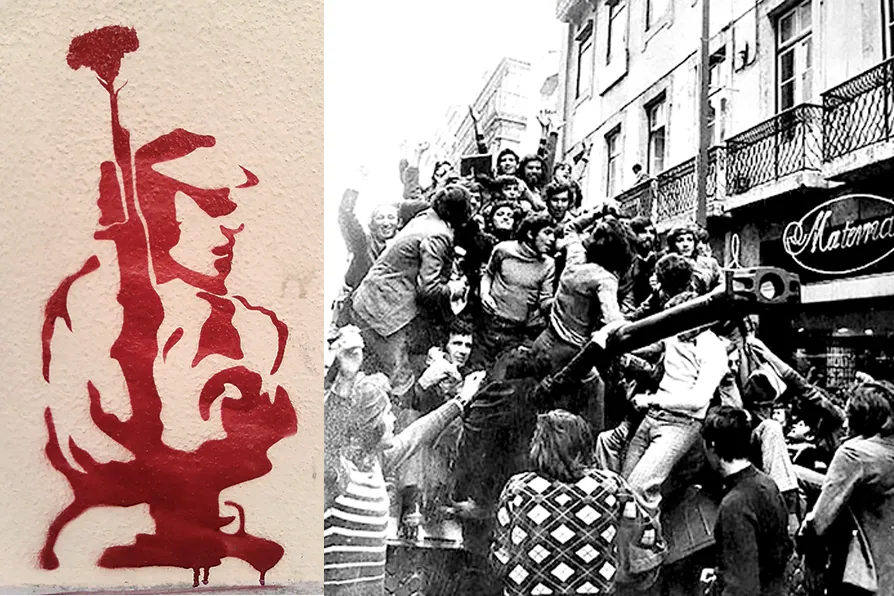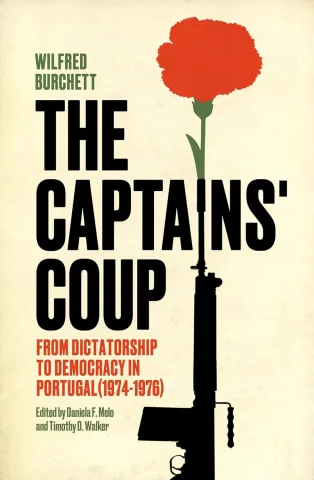SCOTT ALSWORTH suggests that video games have a lot to learn the rich tradition of Marxist theatre
JOHN GREEN welcomes an insider account of the achievements and failures of the transition to democracy in Portugal

 Mural depicting the symbol of the revolution - a soldier with a carnation in the barrel of his gun; People celebrating on top of a tank in Lisbon during the Carnation Revolution of April 25 1974 [Pics: IsmailKupeli/CC]
Mural depicting the symbol of the revolution - a soldier with a carnation in the barrel of his gun; People celebrating on top of a tank in Lisbon during the Carnation Revolution of April 25 1974 [Pics: IsmailKupeli/CC]
The Captains’ Coup: From Dictatorship to Democracy in Portugal (1974-1976)
Wilfred Burchett, Verso, £25
WILFRED BURCHETT was one of the most respected journalists of the 20th century and much admired by his Australian compatriot John Pilger. He had a long, distinguished career, from reporting from the front during the second world war on the effects of the dropping of the atomic bomb on Hiroshima, through the Korean and Vietnam wars, to the Portuguese Carnation Revolution, the subject of this book. It was written in 1975-76 but only published in Portuguese; this is the first English edition. The editors and Verso are to be thanked for making Burchett’s incisive commentaries on the April 25 1974 revolution available to non-Portuguese-speaking readers.
By chance, Burchett and I arrived in Portugal at the same time — three days after the coup by disgruntled army officers — to find ourselves thrown into the tumultuous revolutionary ferment of those heady times. He was a consummate journalist with a keen nose for key historical forces and events.
He interviewed a number of leading figures of the revolution, from army officers Otelo de Carvalho and Melo Antunes, key members of the MFA (Movement of the Armed Forces), to the Communist leader, Alvaro Cunhal. But more importantly, perhaps, he meets some of the many ordinary citizens who played key roles and were caught up in the revolutionary and counter-revolutionary events that took place during those first two years after the coup. He allows the young officers to explain their motivations and their goals.
Burchett had the ability to locate key figures and draw their stories out of them that brings alive the history of that period. He also gives essential context, using facts and statistics but without slowing the gripping narrative. This is history as it happened, seen through the lens of a perceptive, compassionate but also committed journalist of impeccable integrity.
Rather oddly the publishers chose to include an afterword by Tariq Ali written in 1976 and from a very blinkered Trotskyist perspective, in which he predictably blames the Communist Party and its “manipulative deviousness” for “selling out the workers.” Burchett’s narrative eloquently contradicts Ali’s simplistic interpretation and, instead, explains the complexities of the situation.
As the response of the radical prime minister Vasco Goncalves shows, when asked by Burchett if the country’s economic problems could be solved within the framework of the MFA’s programme, there were no easy answers: “We have a heritage of half a century of fascism, compounded by the problem of colonialism … and our people are not very political yet … Many hoped that the fall of fascism would be like the salvo of the Aurora in the Soviet Union, ushering in a new era …”. But that was not the case.
Indeed, many on the left at the time did view the April 25 revolution as one that would usher in full-bloodied socialism, brought about by mass popular pressure. The only aim of the young MFA officers, however, was to overthrow the old fascist regime and introduce democracy.
He also spoke to veteran trade unionists who warned him of the dangers of a right-wing resurgence, of provocateurs, and even misled enthusiasts who would push the strike situation to a point at which the armed forces would intervene “to restore law and order,” with disastrous consequences for the people/Movement of the Armed Forces alliance. Promoting economic chaos was one of the chief weapons used by the capitalist forces to discredit the revolution.
There were, of course, strong elements both within the military and among the population that wished to take the revolution further and bring about a socialist transformation, but the forces ranged against them were too strong. The very reactionary Catholic Church (a mainstay of the old fascist state), along with a powerful capitalist elite, with support from the US, the CIA and Western conservative and social democratic forces managed to divert its course and, in the end, consolidate the old power structures, albeit within a democratic parliamentary system.
Apart from ushering in a stable democratic system in Portugal, the revolution’s greatest achievement was to bring the bloody colonial wars to an end and grant full independence to Portugal’s former African colonies.
A rewarding read for anyone interested in this climactic period.


JOHN GREEN welcomes a remarkable study of Mozambique’s most renowned contemporary artist

A chance find when clearing out our old office led us to renew a friendship across 5,000 miles and almost nine decades of history, explains ROGER McKENZIE

SALEEM BADAT and VASU REDDY introduce a new book about an outstanding interpreter of the world, and an activist scholar committed to changing society

BLANE SAVAGE recommends the display of nine previously unseen works by the Glaswegian artist, novelist and playwright










